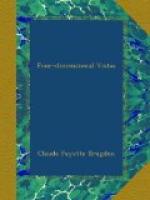In this matter of the wonder, the mystery, the enchantment, of sleep and dreams, the most modern psychology and the most ancient wisdom meet on common ground. Eastern wisdom casts such a light upon the problems of subjectivity that it should not be lightly dismissed. For uncounted centuries Hindu-Aryan spiritual science has recognized, not one plane or condition of consciousness, but three; waking, dreaming, and deep sleep—the gross, the subtle and the pure. In the waking state—that is, with the vehicle attuned to vibrate to materiality—the individual self is as a captive in a citadel of flesh, aware of only so much of the universal life as chances to enact itself before the windows of his prison. In the dream state, when the more violent vibrations of the body are stilled in sleep, consciousness becomes active in its subtle (four-dimensional) vehicle, and ranges free throughout the ampler spaces of this subtler world. In deep sleep, consciousness reverts to its pure condition—the individual self becomes the All-Self: the rainbow, no longer prismatic by reason of its refraction in materiality, becomes the pure white light; the melody of life resolves itself into the primordial harmony; sequence becomes simultaneity, and Time, no longer “besprent with seven-hued circumstance,” is swallowed up in duration.
“There are two paths for him, within and without, and they both turn back in a day and a night.... After having subdued by sleep all that belongs to the body, he, not asleep himself, looks down upon the sleeping. Having assumed light, he goes again to his place, the golden person, the lonely bird” UPANISHADS.
SPACE IN DREAMS
However preposterous may appear to us this notion that the waking state, in which we feel ourselves most potent and alive, is really one of inhibition—that the world is only a “shoal of time”—it is curiously borne out by the baffling phenomena of dreams and is in perfect accord with the Higher Space Hypothesis. The possibility of shaking off the grip of sleep under appropriate circumstances, the fact that we can watch in our sleep, and awake at the right moment, that we can sleep and still watch and keep awake in regard to special objects and particular persons—these things form insuperable difficulties for all those plausible, and apparently scientific, theories of sleep current in the West; but they fit perfectly with the Eastern idea that “he, not asleep himself, looks down upon the sleeping.” And to the questions, “How, and from whence?” in the light of our hypothesis we may answer, “By the curvature of time, consciousness escapes into the fourth dimension.”




